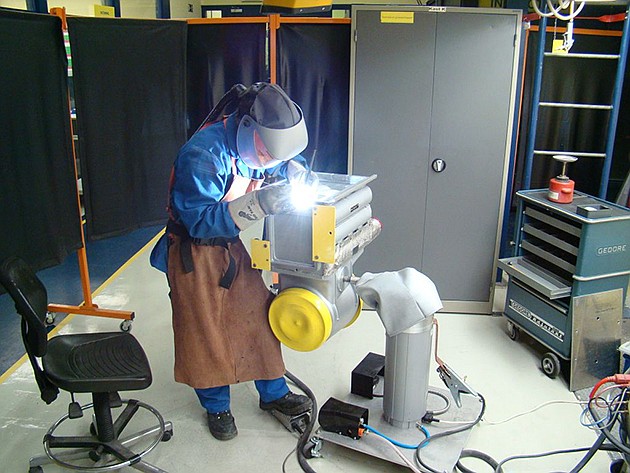- November 24, 2024
-
-
Loading

Loading

Entrepreneur Earl Hagman, who runs a 30-employee, $3 million manufacturing business, thought the solution to his so-called good problem — too much business — was obvious: Get more space.
“We are in the process of losing orders because I don't have the capacity,” says Hagman, founder and CEO of Ergotech, which makes ergonomic equipment for workers in a manufacturing or industrial setting. Clients range from the federal government to a host of Fortune 500 companies, including Boeing, Ford and Gillette. “I can't even tell you how much business we have we can't get to.”
Hagman never thought he would open the much-needed facility in Florida, a state he always considered long on retirees and tourism and short on engineering and technical employees. But Hagman has embraced the Sunshine State after what he says was a costly and trying two years of failed expansion efforts in Danbury, Conn., where Ergotech is based.
Ergotech opened a 6,000-square-foot facility in south Manatee County June 1. Hagman projects the new office could surpass 40 employees and $5 million in annual sales within a few years. Hagman also wants to buy a building, preferably around 25,000 square feet; three possibilities he looked at fell through, which is why he's leasing.
“This is a fabulous state and Manatee County has been fantastic and helpful,” says Hagman. “And they wanted us here, which is the opposite of what we experienced in Connecticut the last two years.”
A native of Sweden with a Ph.D. in occupational health, Hagman founded Ergotech out of his garage 20 years ago. Ergotech now has seven product lines. All the products, from motorized positioning machines to conveyor rollers, have a proprietary design and some are patented. The idea, says Hagman, is to make tough factory jobs easier on people while eliminating strain, fatigue and injuries.
Hagman's experience in Connecticut, in one sense, is a familiar tale to some Gulf Coast business owners and executives. One problem, Hagman says, was a group of vocal neighbors in a senior living complex who didn't want the Ergotech facility, especially the yearlong construction. The site was zoned industrial, but Hagman pulled out rather than face a long legal battle.
Mobilized neighbors and activist groups have thwarted business expansion projects multiple times on the Gulf Coast, from Naples to Longboat Key to St. Pete Beach. In this case Hagman says he spent at least $50,000 on one project, a 20,000-square foot facility in Ridgefield, Conn., before he ultimately quit on Connecticut expansion. “I wasn't going to pour more money into something else there,” he says.
The Nutmeg State's loss became an opportunity — for Ergotech and Manatee County. “I ended up on the front page of newspapers for six months,” he says. “I got calls left and right, north and south.”
Specifically, economic development agencies from Virginia to Georgia wooed Ergotech. A friend in Bradenton suggested Hagman check out Manatee County. That friend connected Hagman with Bradenton Area Economic Development Corp. Director of Project Management Lauren Kratcsh. Hagman says Kratcsh has been an invaluable contact in the move.
Hagman is now focused on quickly growing the Florida facility to catch up with the demand.
Will Hagman move more of the business to Manatee County? It's an open question.
“This is a good starting point, and I feel like this will blossom,” he says. “I don't know what the future holds. It's too early to tell.”
Incentivized Options
Economic development officials often say incentives for jobs are tools that help woo a business to a region, but aren't the main factor when a company decides to relocate. Earl Hagman, in opening a facility in south Manatee County for his Danbury, Conn.-based manufacturing business, proves that theory.
Hagman actually needed to open a facility so badly for the company, Ergotech, he did it before Manatee County officials even approved a performance-based incentive package. That will likely happen later this year. “It's not about incentives,” says Hagman, “and we didn't even do this for the lower taxes in Florida.”
The firm made the Florida decision, instead, says Hagman, for immediate space in a business-friendly climate where officials appreciate entrepreneurs.
Follow Mark Gordon on Twitter @markigordon